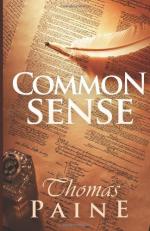
|
| Name: _________________________ | Period: ___________________ |
This test consists of 15 multiple choice questions and 5 short answer questions.
Multiple Choice Questions
1. What does Paine explain about the Almighty's response after Eve bites the apple?
(a) The Almighty allows Satan to remain on earth.
(b) The Almighty banishes Satan to a mountain.
(c) The Almighty banishes Satan to a cave.
(d) The Almighty banishes Satan to a pit.
2. How does Paine describe life in an uncivilized culture?
(a) As a continual holiday.
(b) As a continual vacation.
(c) As an extended vacation.
(d) As an extended holiday.
3. As mentioned by Paine in Age of Reason, what did Jesus preach?
(a) Only morality.
(b) Benevolence and morality.
(c) Only benevolence.
(d) Paine is unaware of the teachings of Jesus.
4. Which one of Burke's books contained several pages quoted from the Rights of Man?
(a) Appeal from the New to the Old Whigs.
(b) Further Reflections on the French Revolution.
(c) Thoughts on the Present Discontents.
(d) A Vindication of Natural Society.
5. How should people self-impose laws in order to exist harmoniously in the absence of government?
(a) Only on a professional level.
(b) On a personal and professional level.
(c) Only on a personal level.
(d) There can be no laws without government.
6. What does Paine think is odd about the conversation between Eve and Satan?
(a) The extensive length of the conversation.
(b) The shortness of the conversation.
(c) Eve is not confused.
(d) Eve is not frightened.
7. Does Paine believe it is possible to evolve from a civilized state to a natural state?
(a) Yes.
(b) No.
(c) He is not sure.
(d) Only in certain cases.
8. What does Paine prove in order to dispel a myth about government?
(a) Only certain societies need government.
(b) Society will fail without government.
(c) Society will not fail without government.
(d) Most societies need government.
9. Where is the church located to which Paine subscribes?
(a) Rome.
(b) He does not subscribe to a church.
(c) In his mind.
(d) Jerusalem.
10. What is Paine's opinion of the dispossession of property?
(a) It is one of the best things to ever be invented.
(b) It is an unnecessary thing.
(c) It is one of the worst things to ever be invented.
(d) It is a necessary thing.
11. What claim does Paine make about cultivation?
(a) It is one of the best things to ever be invented.
(b) It is one of the worst things to ever be invented.
(c) It is an unnecessary thing.
(d) It is a necessary thing.
12. Does Paine believe it is possible to evolve from a natural state to a civilized state?
(a) No.
(b) Only in certain cases.
(c) Yes.
(d) He is unsure.
13. What does Paine think is created between religions by the existence of certain churches?
(a) Hypocrisy.
(b) Animosity.
(c) Jealousy.
(d) Placidity.
14. According to Paine, what age should a person be to receive compensation for an disinheritance?
(a) Thirty years of age.
(b) Eighteen years of age.
(c) Twenty-five years of age.
(d) Twenty-one years of age.
15. What is not present in the Indian culture?
(a) Several different views.
(b) Extreme opposites.
(c) One dominant view.
(d) Extreme similarities.
Short Answer Questions
1. Why does Paine admire the Marquis?
2. What label does Paine give to revelations that have not been witnessed?
3. What makes Paine's goal of every person receiving property impossible?
4. How old is the president of the United States required to be in order to presumably prevent inexperienced people from having the position?
5. On which concept is the new Whig party based?
|
This section contains 618 words (approx. 3 pages at 300 words per page) |

|




